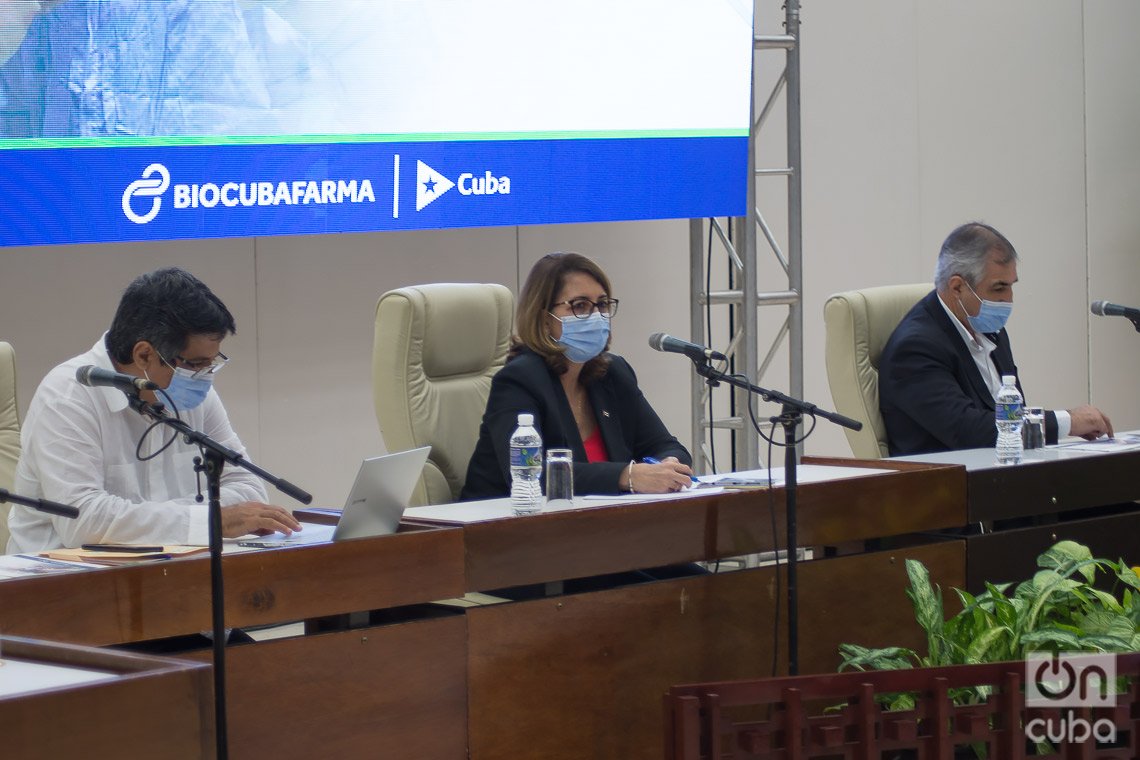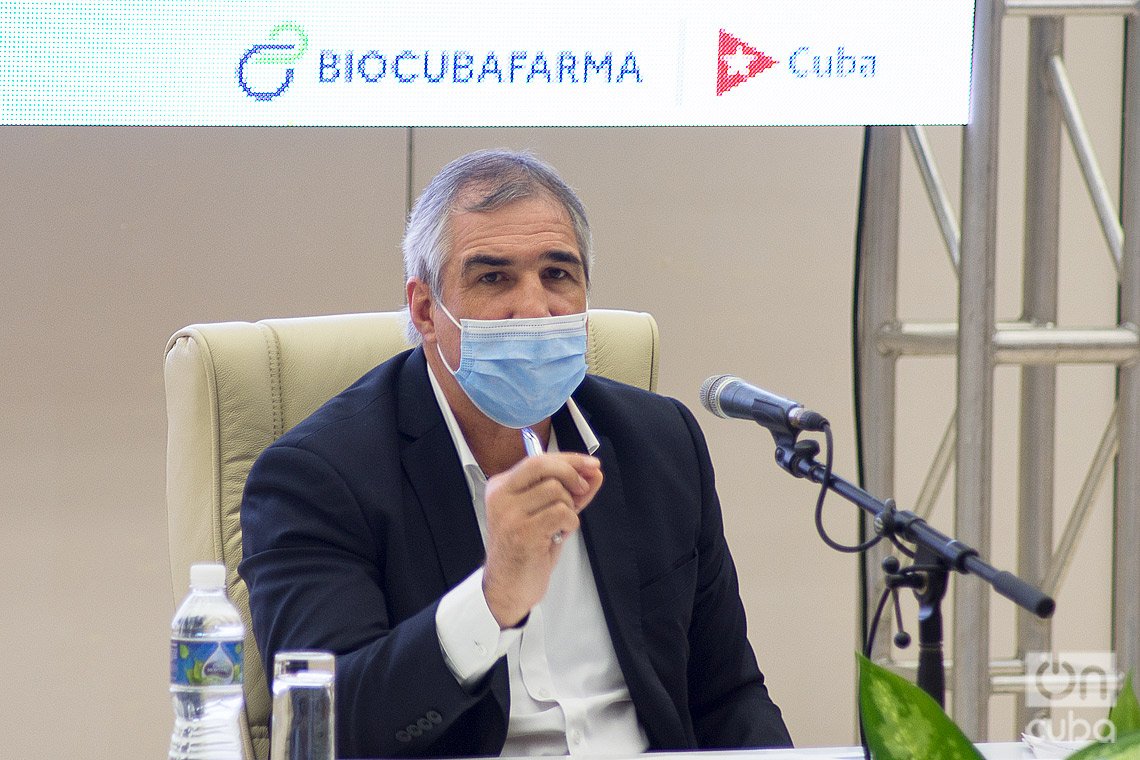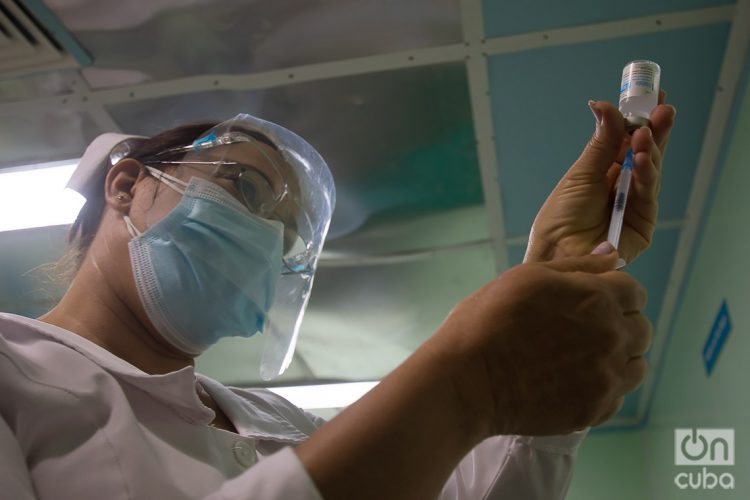Much has been said in recent months about the Cuban COVID-19 vaccines. And it’s obvious. In the midst of a complex economic situation, deepened by the pandemic and the increase in the United States embargo, Cuba has been striving to develop its own drugs and vaccine candidates to deal with the infectious disease, experiencing so far this year its worst wave on the island.
The immunization of several territories and population groups in special interventions has even begun, although without yet having the authorization for the emergency use of the most advanced candidates, and the authorities maintain the intention of reaching 70% of the population in August, and at the end of the year all Cubans who can and want to be vaccinated. It is not a simple goal, but if it is achieved, the country would be at the forefront of mass vaccination in the world with its own injectables and could, if the transmission is controlled in this way, focus on the peremptory recovery of its economy.
Nor has it been easy to get here, as explained this week at a press conference by executives of the BioCubaFarma state group of industries of the biotechnology and pharmaceutical sector, which has shouldered the development of COVID-19 vaccines as “a priority” of its work in the last year. Of the more than 40 projects in which Cuban scientists began to work from the beginning of the pandemic, to the five candidates that finally went on to clinical trials — Soberanas 01, 02 and Plus, from the Finlay Vaccine Institute (IFV), and Abdala and Mambisa, from the Center for Genetic Engineering and Biotechnology (CIGB) —, the road has been long and not without obstacles, perseverance and sacrifice.
As part of a logical process of study, analysis and selecting, “we decided to concentrate on working with a single antigen: the receptor-binding domain of the virus or RBD, and we decided that we were going to obtain it from two different sources, based on technologies that we had in the country, which are well known and highly safe: one from yeast — Abdala and Mambisa —, a platform from which we already obtain other vaccines, and the other from cells of mammals — the Soberanas —, which is another technology with which we have a lot of experience,” stated Dr. Eduardo Martínez, president of BioCubaFarma, who added that, in addition, different administration schemes and concentrations of the candidates have been evaluated that finally advanced to human studies after “positive” preclinical results.

However, as is already known, the finalist platoon also distanced itself and the lead was taken by Soberana 02 and Abdala, the two immunogens that went on to phase 3 trials — with around 90,000 volunteers between the two — and are used today in interventions in risk groups and territories — as part of which at least one dose has already been given to over a million people —, while the remainder have not been ruled out and remain under study, mainly intended as booster doses or for convalescents from COVID-19.
According to data published by the Ministry of Public Health (MINSAP), as of this Thursday 1,431,827 people had had at least one dose of one of the vaccine candidates developed on the island. Of these, 825,411 had been inoculated with two doses and 150 897 have already completed the vaccination scheme. In addition, as part of the clinical trials, intervention studies and health interventions that are being developed in the country, 2,408,135 doses had already been administered, a figure that, moreover, is growing day by day.
Soberana 02 and Abdala: what is known
Although phase 3 of the clinical trials of both vaccine candidates has not yet finished — although the inoculation of the three-dose schemes as part of them has already been concluded — Cuban specialists have reiterated that the safety and immunogenicity reported so far endorse their commitment to them as COVID-19 vaccines and their use in health interventions currently underway.
Cuban researchers have “sufficient data on safety after the application of tens of thousands of doses of the vaccine” and “reported adverse events are very low, and are only fundamentally mild and some moderate,” according to the president of BioCubaFarma, who also pointed out that phase 2 clinical trials have shown that “more than 90%, around 95%, of the people who used the vaccines had an antibody response greater than four times with respect to baseline levels.”
“That is to say, there was actually an induction of antibodies after the application of the candidates. And we have demonstrated by different methods, which are validated and used internationally, that these antibodies have the ability to neutralize the virus,” added Martínez, for whom “this element of high immunogenicity, together with the element of safety, led the Ministry of Health Public, based on its prerogatives as the country’s health authority, to approve the health intervention in populations and territories at risk.”
“For this, a rigorous analysis of the risks and benefits of this process was made by experts with a lot of experience, and from that assessment and with the knowledge of the results of research with other vaccines, with all that antecedent, it was decided to carry out the intervention,” he added.
More than a million persons inoculated in Cuba with COVID-19 vaccine candidates
For the specific case of Abdala, Dr. Marta Ayala Ávila, general director of the CIGB, pointed out that “in the phase 1/2 clinical studies, on the active search for adverse events, the results show that these have been located in a 95% in mild events and 5% in moderate events; and the latter are usually resolved without medication.” In addition, she confirmed that the most frequent are those associated with the administration site, such as pain and increase in volume, and others such as headache, malaise or drowsiness.
For his part, Dr. Vicente Vérez, IFV director, commented that neither in the studies with Soberana 02 and Soberana Plus — as a third dose or booster in convalescent patients — have severe or serious adverse effects or other rare or unexpected effects been recorded “at a level of repetition outside the normal incidence of these events in the number of the population being studied” and reiterated that Cuban vaccines “are supported by very safe platforms, so there is nothing out of the ordinary to expect with these candidates.”
However, both executives assured that the participants in the studies are surveilled “with great responsibility,” and that “all incidents are collected and studied” with a view to their analysis and future publication, even when it is later verified that they have not been associated with vaccination. “But if they occur after individuals are vaccinated, they have to be studied in the context of that study or intervention,” said Dr. Ayala, in a possible reference to events reported on social networks.
And the efficiency?
The percentage of efficacy turned into a headline during the pandemic and the standard used by many to measure the quality of COVID-19 vaccines, remains a mystery in the cases of Soberana 02 and Abdala. Not because its developers do not want to reveal it — which would be essential for Cuban immunogens to be internationally recognized and to be exported to other countries — but because this information is not yet available.
The reason, according to the executives and specialists of BioCubaFarma, is simple: for its calculation, in different cuts previously foreseen in the protocols, it is necessary to reach a number of COVID-19 patients among those who participated in clinical trials, to then, among other assessments related to the symptoms and evolution of the disease, to know how many of these patients were injected with placebo and how many were actually immunized with any of the schemes under study. And the databases are still being collated and processed with a view to a first cut.
“Right now there are already participants in phase 3 trials who have been infected with the virus, and participants who have contracted the disease, and when the amount planned for a first cut is reached, the first records of efficacy can be given, once the codes are opened and it is determined which of these people were injected with the placebo and which with the vaccine candidates,” explained Dr. Eduardo Martínez, who announced that in June the first results should be known, both from Soberana 02 and from Abdala. With them in hand, authorization for their emergency use would be requested from the Cuban regulatory authority (CECMED), which, he said, “has been accompanying all the vaccine processes.”
Both Martínez and the other experts and authorities feel optimistic with the indicators and signs reported to date, and also with the fact that “research has begun to appear in the literature, whose results speak of a correlation between the levels of antibodies that neutralize the virus and the subsequent efficacy of the vaccines,” which if verified in phase 3 of the Cuban candidates would be excellent news. However, they prefer not to create false expectations and handle a wide range of possibilities, in a “challenging” context due to the circulation on the island of strains in the face of which other vaccines already in use diminish their effectiveness.

“We would like our vaccines to be 100% effective, but we know that would not be real. We are doing the studies in a scenario where other variants of the virus are already circulating, such as the strain identified for the first time in South Africa and which is one of those declared as of ‘concern” by the World Health Organization (WHO), and in the face of which it has been seen that other vaccines already approved for emergency use decrease their effectiveness, according to studies. This means that we are doing clinical assessments in a context that is truly challenging for our vaccine candidates,” explained the president of BioCubaFarma.
Martínez recalled that according to the WHO, a vaccine with 50% or more efficacy is “recommended to combat the pandemic” and said that Cuban scientists hope, based on the results of the phase 2 study, “which are really very encouraging, that the percentage will be much higher than 50%.” In addition, he reiterated that previous trials “have shown that our vaccines induce high titers of protective antibodies that neutralize the virus, around 95%,” but it remains to be seen if these figures are maintained in a greater number of people such as those involved in phase 3.
“Saying any number now would be speculating. We must wait for the results of the assessments, which are the ones that will say the last word and are being carried out with all the rigor,” said the executive.
For his part, Dr. Vérez was convinced that “we are going to have important percentages of efficacy, even in the current transmission scenario,” because, he said “we have put the best of our science in our vaccines,” and pointed out that already in phase 3 studies, “a gradual decrease in the number of people who test positive for the virus and become infected” has been observed as the application of the doses progresses. “It does not mean anything yet until we have concluded the clinical trials, because that is what the placebo control group is for, but the decrease in infections that we are preliminarily seeing from one dose to the other is encouraging.”
As support, Dr. Eulogio Pimentel, vice president of BioCubaFarma, revealed to the press data from the intervention study applied to workers from that business group with the two most advanced vaccine candidates and without a placebo. According to them, of the 16,711 workers who received the first dose, 144 tested positive by PCR, while of the 14,858 vaccinated for the second time, only 47 infected were detected, and of those who already received the third dose — about 50% of the workers injected — only 21 have tested positive. These data, Pimentel affirms, “reflect a drastic trend towards a decrease in the number of positive cases” as immunization progresses and provide a guideline on presumed efficacy, even when it is measured against infected and not against positive cases.
The other candidates, the international route
While the data processing of the phase 3 trials of Soberana 02 and Abdala progresses, with an eye to requesting the emergency use that gives the definitive boost to vaccination on the island, the remaining Cuban vaccine candidates are still under study. Of these, Soberana Plus is undoubtedly doing extremely well, both within the successful scheme in which it reinforces two previous doses of Soberana 02 and which is one of those already applied in trials and interventions in the country, as well as in its own trials as a single dose in convalescent patients, which have already advanced to phase 2 and show very good results, according to the experts. Furthermore, CECMED also approved its use in the intervention study at BioCubaFarma, in workers who were infected with COVID-19, although without reaching serious and critical stages.
For its part, Soberana 01 — the first of the Cuban candidates to go through clinical trials — is against the clock to continue its tests, in a context in which the Cuban population could soon be largely immunized. However, Dr. Vérez assures that, due to its values to awaken innate immunity, its developers do not plan to leave it behind and are finalizing a phase 2/3 clinical trial protocol in the central province of Cienfuegos, for approval by the regulatory authority. According to the specialist, the aspiration is to start it at the end of June and develop it with “an upward escalation, to the population of 60-80 years, and another downward, to the pediatric population,” as progress is made in the study.
As for Mambisa, whose novelty is the use of the nasal route of administration — thanks to an antigen capable of activating mucosal immunity in addition to systemic immunity —, it already has a phase 1 study with a two-dose scheme to its credit, in which it evidenced good safety and immunogenicity results, according to Dr. Marta Ayala, who explained that “its placement in niches where people need booster doses” is currently being evaluated, such as convalescent and already vaccinated individuals. For this reason, its developers plan a phase 1/2 trial in convalescents, in which they would use three devices for its administration, such as nasal drops and a spray system that is already manufactured in Cuba “to choose which one to continue with.”
Furthermore, both Soberana 02 and Abdala are taking steps to start clinical trials in children and adolescents, an age group currently outside the already tested vaccination schemes, in which infections and sick people have multiplied in recent months on the island and without which the complete immunization of the Cuban population to which scientists and authorities aspire could not be completed.
Cuba expects to start COVID-19 clinical trials in minors in the coming days
In the same way, the main Cuban vaccines do not only point toward inside the island and negotiations are already underway with governments or private companies from more than 30 countries, according to Mayra Mauri, also vice president of BioCubaFarma. Among the nations that have made their interest public are Iran — where Soberana 02 studies are also being carried out —, Venezuela — which announced the production in its territory of Abdala — and Argentina, whose minister of health visited the island days ago, where she signed a letter of intent with her Cuban counterpart and learned about the development and production of the Cuban COVID-19 candidates.
“Given the very large deficit of vaccines that exists in the world, every day we are receiving requests from many places,” said the executive, who said that the idea that the Cuban authorities are handling “is that as soon as our vaccines have the authorization for emergency use in Cuba, we will be in a position to start passing the regulatory processes of the different countries and to materialize agreements.”
However, Mauri emphasized that in any case, they will continue as a “fundamental principle” the fact of not signing contracts that Cuba cannot fulfill. “In that we are going to be very rigorous and objective,” she said.
The BioCubaFarma executives also reaffirmed “the commitment” to maintain the studies and production of Cuban vaccines and achieve 70% immunization of the island’s population in August, despite the difficulties that the U.S. embargo has caused and continues to cause. Among these, they denounced problems with suppliers that have interrupted the supply of inputs and equipment necessary for investigations and productive scaling, the cutting of links by banks that have prevented making payments and receiving necessary financing, and even some international journals’ “disdain” for scientific publications on the island, although, they affirmed, they continue to work on new publications to show the world the results that are being achieved in Cuba.











Ya me puse mis 3 dosis de Abdala, me siento bien y no tuve reacciones adversas. Todo bien
This is very promising push on cuba push on.